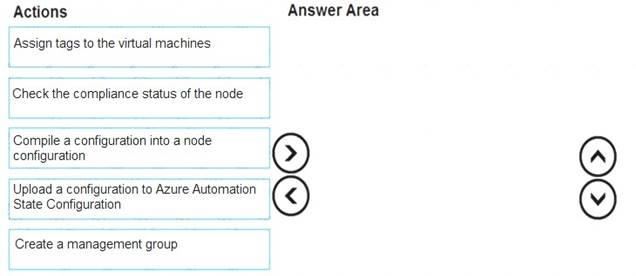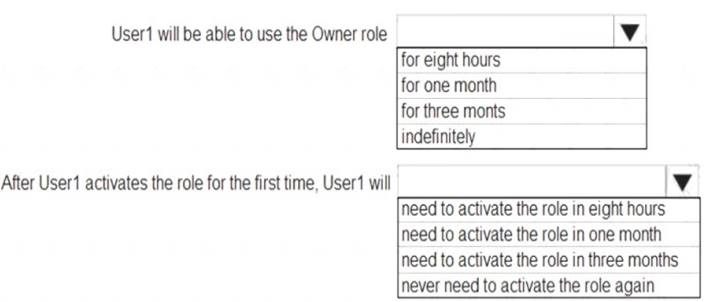- (Exam Topic 6)
Your company has a Microsoft Azure subscription.
The company has datacenters in Los Angeles and New York.
You are configuring the two datacenters as geo-clustered sites for site resiliency. You need to recommend an Azure storage redundancy option.
You have the following data storage requirements:  Data must be stored on multiple nodes.
Data must be stored on multiple nodes. Data must be stored on nodes in separate geographic locations.
Data must be stored on nodes in separate geographic locations. Data can be read from the secondary location as well as from the primary location Which of the following Azure stored redundancy options should you recommend?
Data can be read from the secondary location as well as from the primary location Which of the following Azure stored redundancy options should you recommend?
Correct Answer:
B
RA-GRS allows you to have higher read availability for your storage account by providing “read only” access to the data replicated to the secondary location. Once you enable this feature, the secondary location may be used to achieve higher availability in the event the data is not available in the primary region. This is an
“opt-in” feature which requires the storage account be geo-replicated.
Reference:
https://docs.microsoft.com/en-us/azure/storage/common/storage-redundancy
- (Exam Topic 6)
From Azure Active Directory (AD) Privileged Identify Management, you configure the Role settings for the Owner role of an Azure subscription as shown in the following exhibit.
From Azure AD Privileged Identify Management, you assign the Owner role for the subscription to a user named User1, and you set the Assignment type to Active and Permanently eligible.
Use the drop-down menus to select the answer choice that completes each statement based on the information presented in the graphic.
NOTE: Each correct selection is worth one point.
Solution:
Reference:
https://docs.microsoft.com/en-us/azure/active-directory/privileged-identity-management/pim-how-to-add-role-to
Does this meet the goal?
Correct Answer:
A
- (Exam Topic 1)
You discover that VM3 does NOT meet the technical requirements. You need to verify whether the issue relates to the NSGs.
What should you use?
Correct Answer:
E
Scenario: Litware must meet technical requirements including:
Ensure that VM3 can establish outbound connections over TCP port 8080 to the applications servers in the Montreal office.
IP flow verify checks if a packet is allowed or denied to or from a virtual machine. The information consists of direction, protocol, local IP, remote IP, local port, and remote port. If the packet is denied by a security group, the name of the rule that denied the packet is returned. While any source or destination IP can be chosen, IP flow verify helps administrators quickly diagnose connectivity issues from or to the internet and from or to the on-premises environment.
References:
https://docs.microsoft.com/en-us/azure/network-watcher/network-watcher-ip-flow-verify-overview
- (Exam Topic 6)
You have an Azure subscription that contains three virtual networks named VNET1, VNET2, and VNET3. Peering for VNET1 is configured as shown in the following exhibit.
Peering for VNET2 is configured as shown in the following exhibit.
Peering for VNET3 is configured as shown in the following exhibit.
How can packets be routed between the virtual networks? To answer, select the appropriate options in the answer area.
NOTE: Each correct selection is worth one point.
Solution:
Box 1. VNET2 and VNET3 Box 2: VNET1
Gateway transit is disabled. Reference:
https://docs.microsoft.com/en-us/azure/virtual-network/virtual-network-peering-overview
Does this meet the goal?
Correct Answer:
A
- (Exam Topic 4)
You need to create an Azure Storage account that meets the following requirements:
• Minimizes costs
• Supports hot, cool, and archive blob tiers
• Provides fault tolerance if a disaster affects the Azure region where the account resides
How should you complete the command? To answer, select the appropriate options in the answer area. NOTE: Each correct selection is worth one point
Solution:
Box 1: StorageV2
You may only tier your object storage data to hot, cool, or archive in Blob storage and General Purpose v2 (GPv2) accounts. General Purpose v1 (GPv1) accounts do not support tiering.
General-purpose v2 accounts deliver the lowest per-gigabyte capacity prices for Azure Storage, as well as industry-competitive transaction prices.
Box 2: Standard_GRS
Geo-redundant storage (GRS): Cross-regional replication to protect against region-wide unavailability.
Does this meet the goal?
Correct Answer:
A

